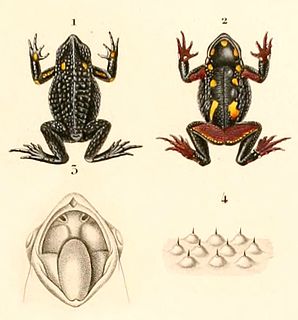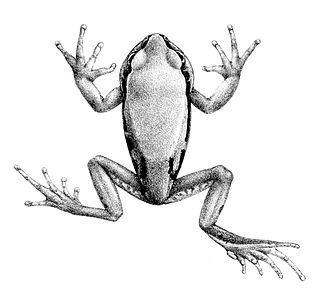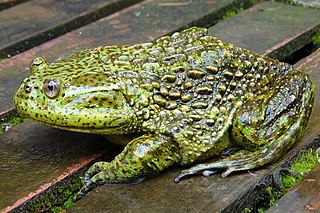
Darwin's fox or Darwin's zorro is an endangered canid from the genus Lycalopex. It is also known as the zorro chilote or zorro de Darwin in Spanish and lives on Nahuelbuta National Park, the Cordillera de Oncol, Cordillera Pelada in mainland Chile and Chiloé Island. This small, dark canine weighs 1.8 to 3.95 kg, has a head-and-body length of 48 to 59 cm and a tail that is 17.5 to 25.5 cm. Darwin's fox displays no key differences between male and female other than the fact that the male has a broader muzzle. Males display no territorial behavior and aren't aggressive towards other males roaming around their territory.

Telmatobufo is a genus of frogs endemic to southern Chile. Their closest living relative is the monotypic helmeted water toad, Calyptocephalella gayi. These frogs were recently removed from the Leptodactylidae and placed in a new family, the Calyptocephalellidae. All three species of Telmatobufo that have been assessed by the IUCN are considered threatened.
Astylosternus schioetzi is a species of frog in the family Arthroleptidae. It is endemic to south-western Cameroon and is only known from two areas near Edéa, Apouh and Koupongo, separated by the Sanaga River. The specific name schioetzi honours Arne Schiøtz, a Danish herpetologist who has worked extensively on African tree frogs. Common name Apouh night frog has been coined for this species.
Leptodactylodon polyacanthus is a species of frog in the family Arthroleptidae. It is found in the highlands of western Cameroon and on the Obudu Plateau in eastern Nigeria. Common name African egg frog has been coined for it.

Rhinella atacamensis, sometimes called the Vallenar toad or Atacama toad, is a species of toad in the family Bufonidae. It is endemic to Chile and occurs between Paposo and Las Chilcas. It inhabits the desert Pacific coastal region with Mediterranean influences and is found in and near oases and streams. Breeding takes place in permanent pools, streams, and rivers. While abundant at a few sites, it has declined overall and gone locally extinct at some sites. Threats to this species include extensive droughts and water pollution as well as extraction of surface water, mining, agriculture, livestock farming, and timber plantations.

Rhinella spinulosa is a species of toad in the family Bufonidae that is found in the Andean Argentina, Bolivia, Chile, and Peru.
Hyalinobatrachium esmeralda is a species of frogs in the family Centrolenidae. It is endemic to Colombia and only known from the eastern slope of the Cordillera Oriental in Boyacá and Casanare Departments at elevations of 1,600–1,750 m (5,250–5,740 ft) above sea level.

Leptopelis broadleyi is a species of frog in the family Arthroleptidae of uncertain status. The Amphibian Species of the World, the IUCN SSC Amphibian Specialist Group, and the African Amphibians do not recognize it, but instead consider it synonym with Leptopelis argenteus. However, the AmphibiaWeb recognizes it as a valid species.

Leptopelis gramineus is a species of frog in the family Arthroleptidae. It is endemic to Ethiopia and occurs on the Ethiopian Highlands on both sides of the Great Rift Valley. Common names Badditu forest treefrog and Ethiopian burrowing tree frog have been coined for it.
Leptopelis modestus is a species of frog in the family Arthroleptidae. Its common names are modest forest treefrog and plain tree frog.

Alsodes barrioi, the Cabreria spiny-chest frog, is a species of frog in the Alsodidae, endemic to Chile; it is only known from its type locality in the Cordillera de Nahuelbuta, Malleco Province. The specific name barrioi honors Avelino Barrio, a Spanish botanist and zoologist who lived in Argentina.

Alsodes vanzolinii is a species of frog in the family Alsodidae.

Alsodes verrucosus is a species of frog in the family Alsodidae. It is found in the Andes of Chile and Neuquén and Río Negro Provinces, Argentina. These frogs inhabit temperate Nothofagus forest where they occur under logs and near damp areas. Tadpoles develop in cold, deep streams. It is threatened by habitat loss caused by logging.

Eupsophus emiliopugini is a species of frog in the family Alsodidae. It is found in the temperate Nothofagus forests of Chile between 40°50'S and 45°20'S, and in the Lago Puelo National Park, Chubut Province, Argentina. The specific name emiliopugini honors Professor Emilio Pugín, for "his contribution to knowledge of the reproductive biology and development of the Chilean frogs". Common name Emilio's ground frog has been coined for the species.
Telmatobius pefauri is a species of frog in the family Telmatobiidae. It is endemic to extreme northern Chile. It was already feared that this species is extinct, but recent research has suggested that the species is extant at several localities in the Arica y Parinacota Region, albeit at low numbers. Furthermore, morphological and genetic data suggest that Telmatobius zapahuirensis is a synonym of Telmatobius pefauri. Common name Arico water frog has been coined for this species.
Telmatobufo australis is a species of frog in the family Calyptocephalellidae. It is endemic to Chile and occurs in the western and eastern slopes of the Chilean Coast Range in Valdivia and Osorno Provinces. Its natural habitats are fast-flowing streams in temperate Nothofagus forest. It is a rare species threatened by habitat loss that is caused by siltation of streams caused by clear cutting and afforestation with exotic species.

Telmatobufo venustus is a species of frog in the family Calyptocephalellidae. It is endemic to Chile and occurs on the western slopes of the Andes in Maule and Bío Bío Regions. Its natural habitats are streams in temperate Nothofagus forests where it is found under rocks along the streams. The only stable population is in the Altos de Lircay National Reserve in Maule. The only other localities, both in the Bío Bío Region, are its type locality in Chillan, where it was not found in 2014, and Ralco where it was last observed in 1981. It is threatened by habitat loss caused by fires, conversion of native habitat to pine and eucalyptus plantations, and in Ralco, hydropower dams. Trout in Altos de Lircay are also a threat.
Aubria subsigillata, commonly known as the brown ball frog or the West African brown frog, is a species of frog belonging to the family Pyxicephalidae. It has a discontinuous distribution from southern Guinea through Liberia and Ivory Coast, and from Nigeria to southern Cameroon, and Equatorial Guinea to Gabon. However, the species delimitation differs between sources, and the International Union for Conservation of Nature has adopted a narrower view where this species only occurs in Cameroon and southward.

Conraua crassipes is a species of frog in the family Conrauidae. It is found in eastern Nigeria, Cameroon, Equatorial Guinea, Gabon, the Republic of the Congo, and the Democratic Republic of the Congo. Presumably it also occurs in the southwestern Central African Republic and in the Cabinda Enclave of Angola. Common name Abo slippery frog has been coined for it.

The Calyptocephalellidae are a family of toads found in Chile containing two living genera, Calyptocephalella and Telmatobufo.
















